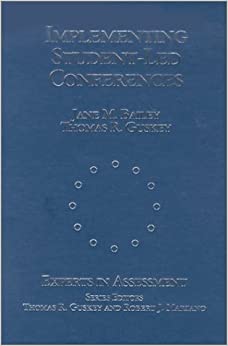Implementing Student-Led Conferences
Jane Bailey grew up in Chelsea Michigan earned her bachelor's and master's degrees at Michigan State University and embarked on her career in public education teaching English and reading at Petoskey High School in Petoskey Michigan. She went on to serve as high school principal in Alanson and Harbor Springs Michigan; as staff development coordinator at the Char-Em Intermediate School District in Charlevoix Michigan; and as director for curriculum and staff development for the Petoskey Public Schools from which she retired in 2008. She was a nationally known education consultant a gifted presenter and co-author of three books on education. Bailey was admired by many as a role model and served as a mentor to numerous young educators. She was a dedicated wife a proud mother and the very best of friends. Her kindness charm keen sense of humor and irrepressible spirit inspired everyone who knew her. She left the world a better place because of her passion for life her dedication to public education and her commitment tThomas R. Guskey PhD is Professor Emeritus in the College of Education at the University of Kentucky. A graduate of the University of Chicago’s renowned Measurement Evaluation and Statistical Analysis (MESA) program he began his career in education as a middle school teacher served as an administrator in the Chicago Public Schools and was the first Director of the Center for the Improvement of Teaching and Learning a national educational research center. He is the author/editor of twenty-seven books and over three hundred articles published in prominent research journals as well as Educational Leadership Kappan and The School Administrator.o excellence in teaching. ... Read more Read less
The term student-led conference' is almost self-explanatory. A student-led conference is a conference with parents led by the student. The classroom teacher's role becomes that of a facilitator. In a student-led conference, students lead parents through a discussion of their work which is usually organized in a portfolio collection. Typically, several conferences are conducted simultaneously in a classroom with family groups seated far enough apart to allow privacy. The teacher circulates among family groups, stopping long enough to make pertinent comments and answer questions. Students primarily direct the conversation which is focused on their work and classroom behavior. The real power in this innovation is that student-led conferences require students to take most of the responsibility for reporting what they have learned. The authors' goal in writing this book is to help readers understand: · Why it is effective for students to lead a conference · What an effective model for student-led conferences looks like · How to prepare and organize for student-led conferences · How to evaluate the effectiveness of student-led conferences ... Read more Read less











